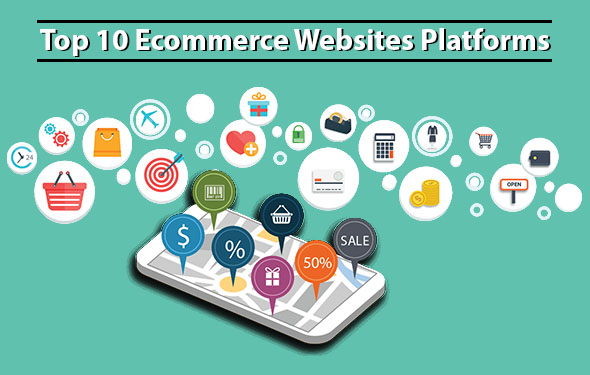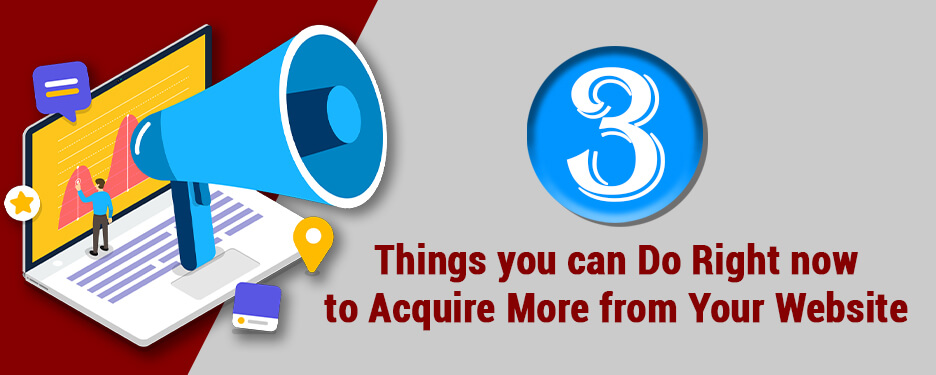Top 10 Ecommerce Websites Platforms in Dubai UAE
Develop a Unique Online Store for Small, Medium & Large-Scale Businesses
Top 10 Ecommerce Websites Platforms:The eCommerce industry is growing day by day, and hence, there is no way to look back at least for a certain period of time. Every single day, new doors are being opened and this is the reason why entrepreneurs are always keeping an eye on this industry. With numerous platforms that are introduced, you can easily develop a unique and strong online store. Each and every platform serves different purposes. Some are popular for their features, while the others have an easy-to-use nature or have amazing customization capabilities. Such as, WooCommerce is suitable for large-scale and medium businesses. Besides this, there are also platforms for artists where they can sell their works in crafts fair. Therefore, if you are not aware of which platform is the best suitable for your business, take help from this article. Here, we are going to discuss all the popular eCommerce platforms in Dubai along with their pros and cons which will give you a better guidance while choosing the best platform.
Top-Notch e-Commerce Platforms: Know the Advantages and Disadvantages
Top 10 Ecommerce Websites Platforms
1. BigCommerce
BigCommerce is one of the best eCommerce platforms that is widely used these days. With amazing features and functionalities, BigCommerce is ruling the field of eCommerce. Because of the Software which is an SaaS-based shopping cart, it provides an extremely easy interface to the users. This is the reason why it is highly preferred by business owners as it helps in providing excellent user-experience and increases revenue. By eliminating the need of coding, you can easily customize the online store. Thanks to the buyer-centric approach, it reflects various integrations like PayPal, FraudLabs, and tons of other apps. Therefore, you should opt for BigCommerce Website Development, as it involves a huge number of developers, marketers, consultants and designers. Hiring a professional will help you to get the best things done without any hassle.
Although there are many reasons for BigCommerce to be popular, one of the major reasons is the themes. The themes are essentially buyer-centric, and have every feature that fulfill all the buyer needs. Furthermore, to enhance your store with additional features, you can make use of the add-ons. The theme store of big-commerce includes all the premium themes which are free and suitable for starting a new online store. Moreover, the custom theme can also be created with the help of BigCommerce. To get a clearer idea, have a look at the pros and cons of the BigCommerce platform that are given below:
Pros:
- With BigCommerce, you will get a lot of learning materials which include customization and marketing your store.
- One of the best platforms for security purposes is BigCommerce. The multi-layered security option is available here to secure your stores. Another significant feature is its speed as it loads at the fastest speed that you cannot even imagine.
- All necessary features are built-in that essentially helps to customize and market your store easily.
- It also includes SEO features that helps to improve the search engine ranking.
- If you want to start a full-fledged online store, BigCommerce is the ideal choice.
- To emphasize your online store, you can apply the tons of BigCommerce add ons.
Cons:
- In case the limit crosses for your revenue, you have to upgrade to bigger deals.
- Lite version of BigCommerce is not available.
2. Shopify
Shopify is the second best eCommerce platform that offers a wide variety of features to develop a robust online enterprise. It comes as a full-package of solutions to fulfill all your business needs with ease. The features that are available here enable you to customize your storefront easily, organize your merchandise and track records of the products and orders with just a few clicks. The language used in the store’s administrative interface is English while other languages are used for other purposes. Hence, it is best suited for all types of business regardless of the size. This is the reason why this platform is widely accepted and offers superiority to the users. Therefore, you should opt for the best Shopify ecommerce website development to get the best guidance. In case you are still wondering what’s new in the Shopify platform, then look through the advanced functionalities that work toward growing your business.
- With a multilingual store, you can go international
- A wholesale set of channel for the high-value customers
- Take the initiative to develop unlimited staff accounts, with the growth of your team
- With Shopify Plus, the transactions charges are quite low
- Shopify Plus offers a truly higher level of support
Because of the amazing benefits, it is successful in capturing a huge part of the eCommerce industry. Hence, you can choose this platform to design your own online store.
Pros:
- The online store can be set up instantly.
- There is no need of any coding knowledge in order to set up your store.
- The customer support of Shopify is very good.
- Shopify themes are also available which can give your store a cool and fresh look.
- With a bunch of apps and add-ons, it adds more power to your online store.
- The Lite plan which is available in Shopify is a great benefit for businesses of small size.
- Like BigCommerce, awesome SEO features are also available here
- The PoS system which is included in Shopify can easily be integrated with your online store as well.
Cons:
- At times, you have to depend on the third-party apps to get certain things done.
- On every payment gateway transaction, there is a charge.
- In most of the Shopify themes, you might come across certain limitations.
3. 3DCart
If you want to sell any product online, then 3DCart is your ideal choice. The built-in features that are available here basically focus on designing, creating, marketing, and managing your store in the best possible way. Maintaining offline as well as online payments becomes quite easy here. Other than this, dealing with your inventories, and setting up real-time delivery options are a huge added benefit. This platform doesn’t require any expert programming knowledge.
Therefore, opt for 3DCart ecommerce website development and get the best guidance for the modification of your online store. You can also look through the pros and cons of 3DCart that are given below:
Pros:
- In 3DCart, a wide variety of checkout options are available
- Unlimited storage facilities are offered to the users.
- Amazing SEO features and integrations of social media.
- 3DCart offers your store a decent look and responsive features.
- In order to offer the best services, the platform is being updated day by day.
Cons:
- Although free themes are available, the quality might not satisfy you.
- No interactive and informative dashboard.
- Unlike BigCommerce or Shopify, enough time is consumed to understand the entire platform.
4. LightSpeed
The most dominant POS (Point Of Sale) and eCommerce software is the Light speed. You can bring back the customers more frequently. Thanks to the omnichannel shopping features! This is the reason why it is mostly preferred as it offers spontaneous and reliable POS system and eCommerce solutions. Retailers can easily have the command over their online as well as physical store with the Lightspeed onsite. It also has other added features like enjoying multi linguistic options, managing functions, selecting default language as per your choice, handling sales & customers from your system. To get better clarifications, please go through the advantages and disadvantages of the LightSpeed platform that are given below:
Pros of LightSpeed:
- In the initial stages, the editing and customization is quite easy in LightSpeed.
- The bandwidth usage can be enjoyed unlimitedly here.
- The features of social media marketing and SEO are amazing.
Cons of LightSpeed:
- Only a single plan is available in LightSpeed which might not be appropriate for small businesses.
- The themes that are available in LightSpeed are billed monthly, which is a huge cost for small sized businesses.
- In case edits are made in theme codes & CSS, you will not be provided with any support services.
- Unlike other eCommerce platforms, the payment integrations are very limited.
5. Magento
In order to develop a state-of-the-art e-commerce platform, Magento is the best option. It is available in a feature-packed development tool with which you can easily customize your online store. Besides this, it also offers a highly active user forum which is necessary for web developers. When the concern is customization, there are endless options and possibilities that are offered by Magento. The ton of exciting themes will help you to create one of the most dynamic stores that can add shine to your enterprise. This is the only reason that this platform is mostly preferred by the big brands as they can invest sufficient money and resources. Therefore, go for the best Magento Website Development and develop the store with a variety of unique features.
Pros:
- With the vast community, it gradually helps in developing the platform and eliminating bugs if any.
- Magento templates have numerous options to choose from.
- Magento add-ons & widgets are updating and evolving.
- In terms of SEO, Magento stores perform the best.
- The online stores that are developed here are mobile-friendly.
Cons:
- A powerful hosting environment is required for the Magento platform
- If you want your site to perform well, an ample space and memory is required
- An expert developer is required to customize your store at the complex level.
6. WooCommerce
WooCommerce is the fastest growing, open-source platform for developing e-commerce sites. This popular E-Commerce development software is much faster than its contemporaries. It is a perfect blend of WordPress, eCommerce and existing plugins. Infinite design options and payment gateways provide more flexibility to customers. Active community support for functionality upgrades are available here. In order to monitor and manage the performance, dashboards and widgets are introduced. Here are a few advantages and disadvantages of choosing WooCommerce that will provide you a better guidance.
Pros:
- With the limitless customization options, you can gradually design a store as per your requirements.
- A group of talented developers are always here to guide you in the best possible way as it is the best open-source platform.
- In case of SEO performance, WooCommerce stores are quite compelling.
Cons
- The customer support provided is not very quick.
- To build an online store, an expert with in-depth knowledge is required.
- Often, security issues are encountered on WooCommerce stores.
7. Wix
Because of the simple interface and affordable prices, Wix is one of the most popular platforms. No coding knowledge is required to use Wix. With just a simple drag and drop of components, you can develop a beautiful online store that can fulfill all your needs. There are more than 510 templates that you can try here which is the best among all the features. The templates that are available are suitable for electronics, food & drinks, fashion, sports, clothing, and many other niches. For mobile devices, Wix designs the best online store.
Pros:
- Multiple template options are available here
- Compared to other eCommerce platforms, the plans are quite affordable.
- Tons of articles and tutorials are available online in Wix help centre that will give you a better guidance to create the best online store.
- The free plan that is available here never expires. However, with a free plan, you cannot sell anything online but unlimited time is provided to you.
Cons:
- For starting an online store, Wix is the best option. But it is not the most appropriate platform for large-scale stores. When your business grows, you might have to shift to a bigger eCommerce platform as limited customization options are available here.
- Due to the custom codes, it is even hard to migrate as well.
8. Squarespace
Being one of the best SaaS eCommerce platforms, Squarespace is widely used because of the beautiful templates and unmatched design capabilities. It eliminates the need of finding the best suitable template for your business because it has a huge collection of themes. Before you continue designing your site, it is recommended to get hands on the Squarespace Editor.
Pros:
- The templates of Squarespace are feature-rich, and the huge collection covers a wide range of industries.
- The designs of the templates are responsive. This means that the online store that is developed here is mobile-friendly.
- You will get better options to edit fonts, colors, images, sidebars, and background images with the style editor that is available here. And this requires no coding knowledge.
Cons:
- In case of adding rich snippets, it is quite a tedious job here.
- In terms of features, “Personal Plan” is inferior
- Importing and exporting of digital products cannot be done here.
9. Volusion
Volusion is best known as a leading hosted eCommerce platform. It basically focuses on providing a full kit to the businesses with customer management, inventory management, marketing features, and much more. The best part of Volusion is that it offers amazing customer support with rapid response. You can also take help from online where materials are available and are simply based on how to build an online store with Volusion. If you want to build an online store with Volusion, you don’t have to be tech-savvy. Therefore, to know more about the benefits and flaws of Volusion, look through the points that are given below:
Pros of Volusion:
- A comprehensive set of tools are offered by Volusion that gives a better guidance to build a great online store, eliminating the need of coding knowledge at the same time.
- As mentioned before, the support system of Volusion is available 24×7 so that you can seek help anytime.
- In case of the lower plans, no transactions fee is charged.
Cons:
- The bandwidth of every plan that is available here has a limit. So, after a extended period, an upgrade is required.
- Extra bucks are required to be paid for SSL certificates.
- In-built blogging function is not available here
10. PrestaShop
PrestaShop has earned tremendous popularity in the recent years due to the customization features that are available here. It was first launched in 2017 and is responsible for creating over 2,70,000 stores across the world. Being one of the most amazing open source shopping carts, it allows you to download for free. But this doesn’t also indicate that it is a zero-cost shopping cart. Charges are required for web hosting and other modules in order to complete the online store set up process.
If you have in-depth knowledge of HTML, CSS, and PHP, it is the best alternative platform for them as well. PrestaShop comes in hosted version which is generally known as “PrestaShop Ready” and also in the downloadable version. So, if you are thinking to start your online store with PrestaShop, at first, look at its advantages and disadvantages that are stated below:
Pros:
- Easy to install the software and it is hassle-free.
- PrestaShop is ease to use and contains a very friendly user interface.
- Being one of the most popular platforms, the support system of PrestaShop is available for many languages in different countries.
- As it is an open source resource, anybody can use it.
Cons:
- Despite being an open source platform, it is dependant on HTML, CSS, and PHP.
- As there is a need to hire resources, small businesses do not find it relevant
- To set up a basic store, the free version is appropriate but for a decent store, you have to purchase some modules.
Bottom Line…….
The above information will give you a better guidance about which is the best suitable platform for your online store. However, based on the discussions above, BigCommerce and Shopify are the best eCommerce platforms available for small and medium businesses. These are putting in extra effort to provide the best services to these two segments of business. This is why these both platforms are best preferred by the eCommerce business owners.
Depending on the budget and manpower, all these eCommerce platforms are well suited for medium sized businesses. But enough potential is required to set up a strong medium scale business. When it comes to large scale businesses, WooCommerce, Magento, and PrestaShop are the best fits. However, they might require extra resources. Hope this article will help you to select the best platform that suits the development of your online store. Therefore, choose the best one and create the most attractive online store to grow your business to the next level.
FAQs
- Which eCommerce platform is best for small businesses?
- Selz.
- Shopify.
- Wix.
- BigCommerce.
- SquareSpace.
- WooCommerce.
- OpenCart.
- BigCartel.
- How do I start an eCommerce platform?
- Create your product.
- Determine the pricing for your online store.
- Figure out shipping options.
- Choose your eCommerce platform.
- Pick a domain name and brand name.
- Build your eCommerce website.
- Set up your merchant account.
- Add an SSL certificate to your website.
- Do I need a business license for online store?
According to the jurisdiction, where your home is located, a general business license is required. This is the reason why most general business licenses have to be renewed annually. Sales tax registration is also necessary in case you are selling tangible goods.
- What is Shopify eCommerce?
One of the most effective eCommerce website builder is Shopify. It enables merchants to design, develop, market, and sell any type of goods to consumers around the world.
5. How do I create an online store for free?
- Log in to your account or sign up for free.
- Pick a template from the Online Store category
- Edit text and add your business name.
- Click “My Store” & “Manage Your Store”.
- Add products to your store.
- How do I get more customers online?
- Hold a Sale
- Run a Competition
- Give Free Samples
- Partner Up
- Write Targeted Blog Content
- Offer a New Product / Service
- Advertise
- Participate in Social Media




